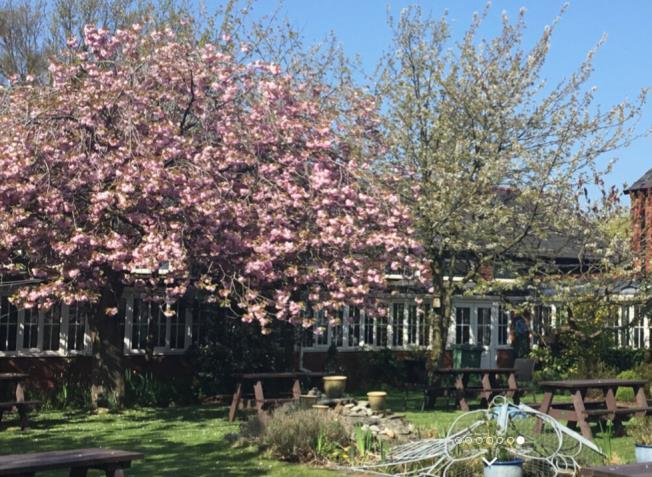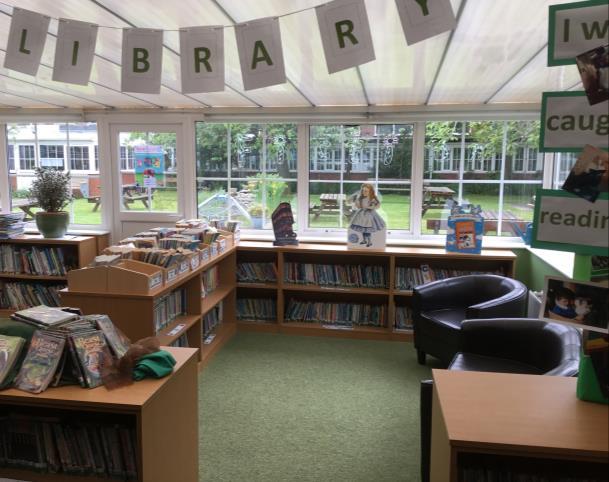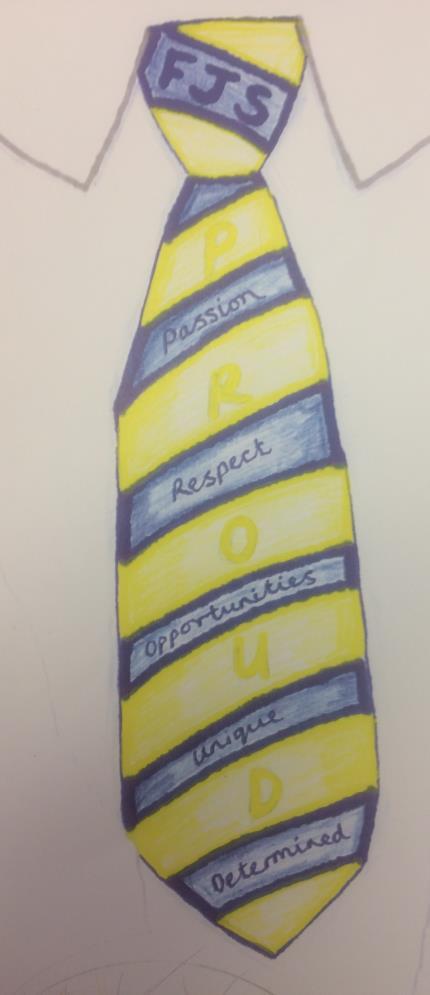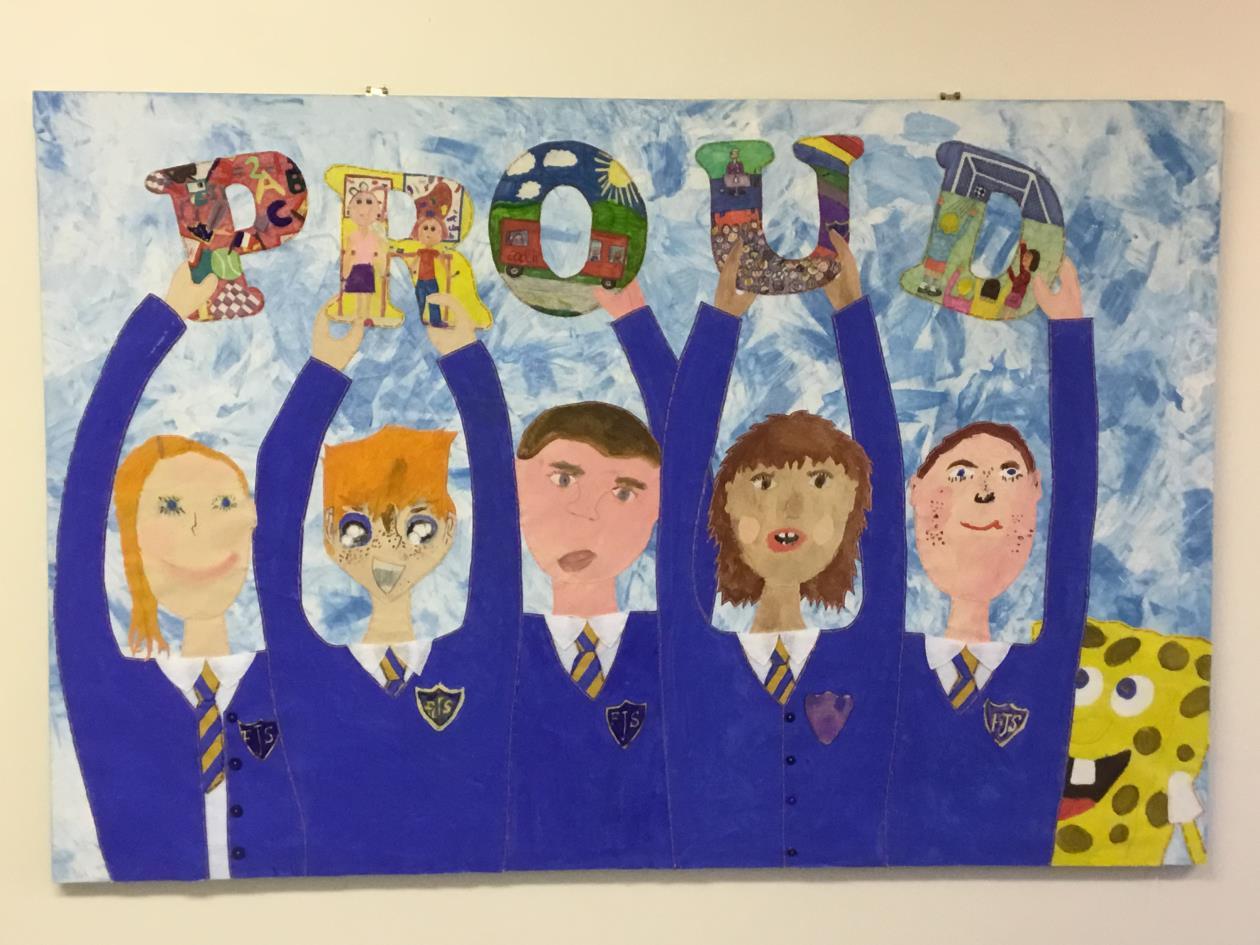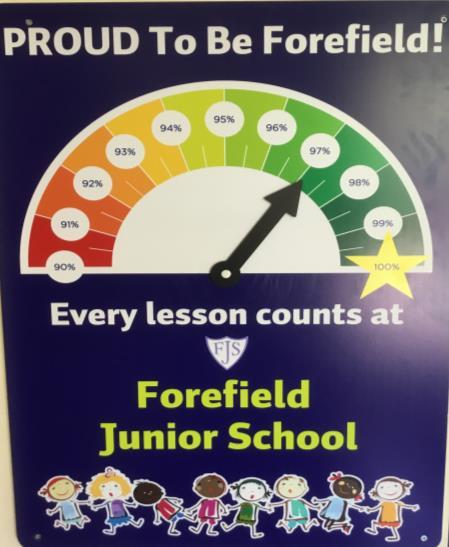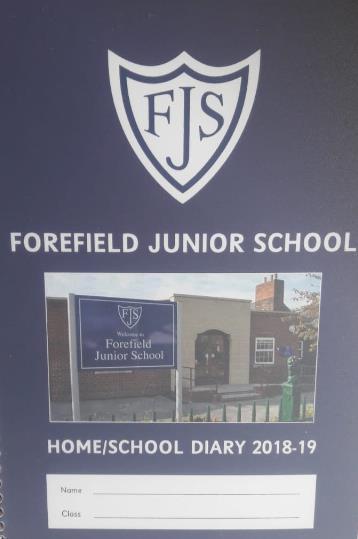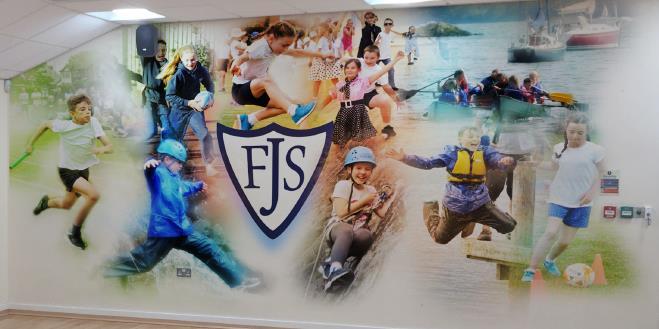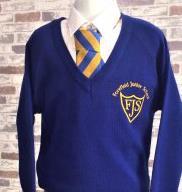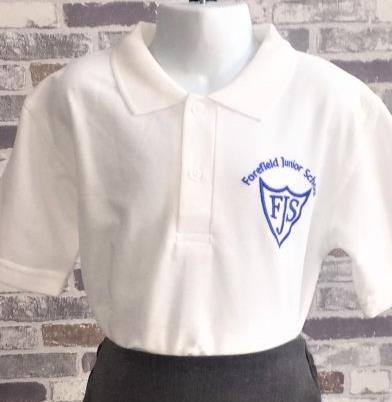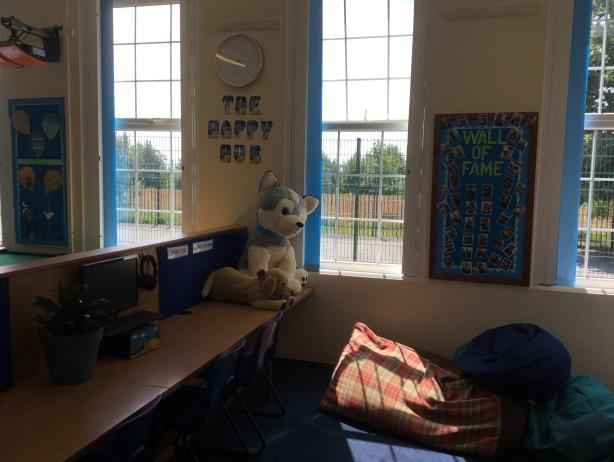P.R.O.U.D.
Forefield Junior School is a P.R.O.U.D. school built on Passion and Respect, where
Opportunities can be seized by Unique and Determined learners.
We are passionate about learning in an environment where everyone is empowered to be themselves and to flourish. We respect and value each and every individual and cherish their unique qualities to create a sense of belonging. We are determined to support personal, social and emotional development by encouraging self-belief and providing opportunities for everyone to express themselves and grow in confidence.
By celebrating their diverse contribution to the life of the school and the wider community, each person will be encouraged to build on their foundations, to instil a belief in everyone that they have limitless potential and are always capable of achieving their best - throughout their lives. As a family we share each other's successes and take pride in them.
We will consistently promote the highest of standards in every aspect of school life, provide a vibrant, stimulating curriculum in a safe and happy learning environment, to foster excellent attitudes and behaviour. The inspirational opportunities we provide will fuel a passion for learning and a sense of pride in all we do.
This is what makes us PROUD:
In addition to the curriculum, our Pupil Guarantee aims to ensure that every child finds their passion through:
• Regular experiences of the Arts - on stage, as an audience and as an artist/musician, enjoying a range of styles and influences;
• Encountering a variety of sporting activities - competing at individual and team level, and pursuing this interest beyond the school or just for fun;
• Developing a curiosity about the world around them - through science, nature or learning about other cultures, and discovering a sense of wonder;
• Making healthy lifestyle choices - knowing how to eat well, exercise and promote their own well-being;
• Extending their learning through visits and visitors - opening their eyes to the world beyond the school walls, culminating in a residential visit to Ambleside in Year 6.
From each experience, pupils can gain the strength to know that it is OK to be different and to encourage and appreciate the success of their friends.
MEET THE TEAM – September 2023
Headteacher: Mr Swift
Deputy Headteacher: Mrs Russell
Teaching Staff: Year 6: Mr Croot, Miss Cain and Mr Wood (TLR post)
Year 5: Mrs Harding, Mr Shannon and Mrs Schwartz
Year 4: Mrs Hill, Mrs Wilson and Mr Parry
Year 3: Miss Berry, Miss Mawdsley, Miss Khan and Mrs Summers
Mrs Barton (SENDCO) and Mrs Russell (DHT) provide additional expertise to support pupils during the morning throughout school.
Mrs Lambrianides, Miss Smith and Miss Gerrard work alongside part-time staff and cover PPA.
Miss Harper will be supporting a group of Year 4 children until July.
Bursar: Mrs Wright Secretary: Mrs Dean
Admin Assistant: Mrs Hill
Learning Mentor: Mrs Newell
Teaching Assistants: Mrs Bullimore-Jones
Mrs Cheetham
Mrs Davies
Miss Dunne
Mrs Elston
Mrs Murray
Mrs Rainford
Mrs Watling
IT Technician: Mr Marriott
Cleaning Staff: Mrs Dexter
Mrs Gavin
Mrs Routledge
Welfare Staff: Mrs Billington
Mrs Dickson
Mrs Hanlon
Miss Sumner
Play Leader: Mrs Falconer Cook-in charge: Ms Larkey
Premises Officer: Mr West
Mrs Clarke
Mrs Dempsey
Miss Gobin
Mr Snowdon
Mrs Wright
Mrs Ellis
Mrs Morris
Mrs Burleigh
Mrs Grace
Mrs Hill
ADMISSIONS
Sefton Council coordinates all applications for school places for all schools for children resident in Sefton (except for Special Schools and Independent Schools). Parents who move into or within Sefton and require a school place outside of the normal transfer times should apply for a school place by contacting the In-Year Admissions Team on 0151 934 3590 or send an e-mail to iyadmissions@sefton.gov.uk. Parents considering sending their child to our school are welcome to visit at a mutually convenient time. Arrangements may be made by telephone. Every child in Forefield Infant School is automatically allocated a place in the Junior School. In the event of the number of applications exceeding the places available the Governors have approved the following criteria for admission:
First Priority: Children who are in public care when preferences are expressed and who are expected to be still in public care when admitted to school.
Second Priority: Children who have a sibling living in the same house who already attend the school provided that they will still be in attendance at the school in the September of admission.
Third Priority: Other requests that name the school as a preference. Priority will be given to those living closest to the school.
Parents are reminded that their position on any waiting list could change if, for example, families move closer to our school and therefore have a higher priority to a place.
Parents who are refused admission to our school have a right to appeal. Details of appeals procedure may be obtained from the Education Department, Town Hall, Bootle L20 7AE.
ORGANISATION OF EDUCATION
Forefield Junior School provides education for children 7+ to 11+, covering four years. All years contain three parallel classes of mixed ability children. Children in Years 5 and 6 are usually taught in four sets for the daily mathematics lesson. These sets are organised in a way to support the learning of each and every child in this important curriculum area. In other subjects, teaching strategies and styles are adapted according to class, group, or individual requirements. Rigid timetabling is inappropriate at Junior School level, but our day is divided into four units of approximately 1 hour in duration to ensure that all areas of the curriculum are explicitly covered.
THE SCHOOL DAY:
08:45
09:00
09:30
Doors open and Registration
Key skills session or assembly
Lesson 1
10:30 Break time
10:50
Lesson 2
12:00 Lunch time
13:00 Guided reading
13:30
Lesson 3
14:30 Break time
14:45
15:30
Lesson 4
End of the day
PUNCTUALITY AND ABSENCE
• Children must be punctual for school on all occasions, and should be in the playground promptly before morning and afternoon registration.
• By law, absence from school must be covered by a note or telephone call from the parents concerned, and should normally only occur in the event of illness.
• Our school day commences with registration.
• If children arrive after this time, they must report to the Office to obtain a ‘late’ mark.
• If pupils are absent from school for any reason parents should inform the School Office, before registration, so that we know the children are safe at home. This should be done on the first day that a child is absent.
• From 1st September 2013, a change in legislation enforced a ruling that schools are no longer permitted to grant any leave of absence during term time, including leave for family holidays. Any application for leave must be in exceptional circumstances and the Headteacher must be satisfied that the circumstances warrant the granting of leave. Parents can be fined for taking their child on holiday during term time without consent from the school. Holidays will not be authorised.
• The school has to send a return to the Department for Education indicating all unauthorised absences. It is very important that parents should ensure their children attend school as often as is possible.
We provide a wealth of opportunities for our pupils and know that ‘every lesson counts’ if children are to make progress. Our School Council keep a keen eye on our weekly attendance, because every time we hit 97% they claim £10 to spend on playground equipment for the school!
An Attendance Trophy is awarded each week and children receive certificates for 97+% and 100% attendance.
Our Attendance Data shows that we are consistently above the national average – but we would like to do even better!
Punctuality is very important: whilst everyone may be late from time to time it is disruptive to learning, both for the individual child and the class, if lessons are interrupted by late arrivals.
SCHOOL TRIPS, RESIDENTIAL VISITS & REPRESENTING SCHOOL IN A TEAM
As children progress through our school their talents may well be recognised by selection for one of the school's sporting or cultural activities. Children selected to represent Forefield Junior School must at all times behave in a responsible, courteous manner. If children cannot be trusted to behave in an appropriate manner, then the privilege of representing the school will be withdrawn.
Similarly, our school has an excellent reputation when we take our children into the wider community on trips and outings. Each year group has many visits to enhance the curriculum. However, pupils who cannot be trusted to behave appropriately will not be taken out of school.
HOMEWORK POLICY
The school expects its children to extend and reinforce their learning out of school hours in the following ways:
• Reading
• Multiplication and division facts to learn and recall quickly
• Spellings to learn
• Work which requires further research or completion
• Extra work for those who require additional practice
We use SeeSaw to share home learning with pupils and parents. This considerably reduces the amount of paper we use and ensures that children can not ‘forget’ or ‘lose’ their homework.
Children have access to a variety of online learning resources (TT Rockstars, Lexia, Active Learn, etc) to support them with their learning. User names/passwords for these resources are allocated annually so that children can access these resources at home as well as at school.
All children have a Home/School Diary and that is taken home each day Children fill in their diary each week with events for the forthcoming week. Parents are asked to sign the diary each week and to use the diary to support and encourage their children and inform teachers of any concerns.
A reading diary encourages children to read each day. As soon as a child has completed a book they can change it for a new one – we have thousands of books to choose from and our Reading Ambassadors do a brilliant job of choosing new books to replenish our library on a regular basis.
HOME-SCHOOL LINKS
We highly value the support of parents, grandparents and carers and welcome any communication. Mr Swift is available at the start and end of the school day (but may be taking assembly that day) , as are any teaching staff who are not leading clubs/activities. Parents are invited to view their children's work at school and discuss progress once a term at a pre-arranged time. Before Parents’ Evening, we alert parents by text message to sign up for an appointment online. If other problems should arise, Mr Swift, Mrs Russell or class teachers will immediately contact the parents. We will also be happy to speak with those who request meetings.
Parents can help their children receive a better education. When parents take an interest in their children and support their learning, pupils stand a much better chance of success.
To help keep parents informed, the home-school diary will be taken home each day. This should be signed by parents each week and will then be counter-signed (or stamped) on its return.
A weekly newsletter “Forefield Matters” is available via SeeSaw and our website/Twitter feed every Friday. This keeps parents up to date with the life and work of our school.
Each class in Years 3, 4 and 5 host a special assembly once a year to which parents are invited. Year 6 hold a very special performance to celebrate their years at Forefield. Parents are again invited to this most memorable occasion.
Please ensure that any messages that need passing to your child or their teacher are in writing. Also, any items that need passing to your child are clearly marked with their name and class. There is a ‘drop box’ in Reception for any items that pupils may need.
Our website www.forefieldjuniors.co.uk is a vibrant, continually updated showcase portraying the life and work of our school.
All schools are expected to have a Parent Support Advisor (P.S.A.). This designated person will help any parents who feel they may require assistance in accessing support to meet their family’s specific needs. Parents who need assistance are invited to contact Mrs Russell, who is not only our Deputy Headteacher, but also our designated P.S.A. Alongside Mrs Russell, our Teaching Assistants form a very caring and supportive Pastoral Team to ensure the well-being of all pupils. Mrs Elston and Mrs Rainford are designated ELSAs (Emotional Literacy Support Assistants). Our Learning Mentor – Mrs Newell works closely with our pastoral team to support children overcome barriers to learning.
SPORTS
Forefield Junior School has a justified reputation for a wide range of sporting activities, both curricular and extra-curricular. We are proud to have been awarded the Active Mark Award from Sport England. A structured, well-resourced timetable including swimming, athletics, games. P.E. and dance ensures that the full National Curriculum programmes of study are delivered.
Forefield has a large enclosed play area and a multi-use games area (MUGA). Lunchtimes include opportunities for ‘active’ sessions with our Play Leader – utilising a range of equipment and resources: a mile track, 25m sprint track, active zones and ‘Go Bananas’ and ‘Pirate Ship’ play areas and a trim-trail.
The school enters teams in local leagues and tournaments in a wide range of sports including
swimming, football, netball, cross-country, cricket and athletics. These are treated as extracurricular activities.
Working with external providers, children also have the opportunity to participate in a range of activities, such as: football, gymnastics, dance, judo, fencing, archery and 'Active Kidz'.
OTHER OPPORTUNITIES
There is always something happening in school and we are proud of our facilities, resources, opportunities and academic success.
In-line with our ‘Pupil Guarantee’ we provide a wealth of extra-curricular and enrichment activities, for example:
• Visiting Theatre Companies perform plays such as ‘The Lion, The Witch & The Wardrobe,’ ‘The Railway Children’ and ‘Aladdin.’
• We receive author visits, support World Book Day and work with our local bookshop.
• Each week throughout the year we provide lunchtime and after school clubs, such as: maypole dancing, judo, art, sign language, mindfulness, football, netball, cricket, dance and drama.
• Every child learns to swim and to play a musical instrument.
• Music tuition happens every week and many pupils access drumming, guitar and keyboard lessons.
• There are class visits in every year group to places such as Chester, The World Museum, Crosby Beach and, in Year 6, our pupils complete Outdoor & Adventurous Activities during a residential visit.
• Every area of the curriculum is enhanced through visits and visitors, such as visiting local places of worship, partner schools and inviting specialists into school - we’ve even had visits from owls, tarantulas and snakes!
• We also receive visits from our local churches during Christmas and Easter and we encourage charitable works by supporting: Macmillan, Children In Need, Cancer Research, The Jospice, The British Legion, Alder Hey Children’s Hospital and other local causes.
BEHAVIOUR (see Behaviour Policy)
• The school expects all children to behave in a responsible and acceptable manner,
• The school prefers to emphasise the positive values of good behaviour. A traffic light system of Red/Yellow and Green operates throughout school – with clear warnings and opportunities to improve behaviour.
• Children are awarded special certificates as a reward for good behaviour. Pupils have the opportunity to gain bronze, silver, gold and platinum certificates, which may be proudly taken home to share with family and friends.
• Children are awarded “diddi-dots” for very good work or achievement. These are collected on a special reward card. Once the card has been completed, special prizes chosen by the house captains who represent the voice of the children are presented.
• Children belong to one of five PROUD teams and are awarded PROUD points for their team for behaviour that reflects our PROUD values. Winning teams celebrate with PROUD Playtime.
• Unacceptable behaviour will result in a sanction SEE THE FLOW CHART – Your Behaviour is Your Choice.
• Pupils, regardless of age, are responsible for conducting themselves in a manner that does not violate the rights of others. They share with their teachers the responsibility for developing a climate within the school that is conducive to productive learning and living.
• We encourage our children to be self-disciplined, to develop a sense of regard for their fellow pupils, and to take a pride in their school and their community – reinforced by our emphasis on being ‘PROUD to be Forefield.’ During Celebration Assemblies each week, the Headteacher will also present ‘PROUD’ Certificates and share out of school achievements.
• Parents are strongly encouraged to discuss the ‘Home School Agreement’ (contained within our Home/School Diaries) with their children and return a signed copy.
SCHOOL MEALS
• We provide an excellent choice of imaginative, healthier lunches that cost £2.60 per day. This includes a main meal, dessert or fruit and a drink. Payment for school lunches is made online through School Money.
• A full menu is made available every week to help children and parents make an informed choice at lunchtime
• Some children prefer a packed lunch, especially in the summer months. (For safety reasons, food in tins, hot drinks or soup in flasks, as well as cold drinks in glass bottles, are not permitted. Drinks should be brought in plastic bottles and straws or plastic cups enclosed.)
Good behaviour is expected in our dining rooms at all times. We welcome children to stay at school for their lunch. However, children who cause problems during the dinner hour by behaving inappropriately will be asked to have their lunch at home or will stay in school and eat under SLT supervision.
Staff should ensure that pupils choosing a school meal are given the appropriate wrist band before the start of lunch.
SCHOOL UNIFORM
Forefield pupils are PROUD to maintain a high standard in personal appearance. The strict adherence to our school uniform fosters a feeling of identity and co-operative spirit within our school and limits the influence of frequent changes in fashion and the resultant cost to parents.
We wear:
A royal blue V-neck school pullover or cardigan (with or without the school logo)
Grey tailored trousers or shorts with grey socks
Grey pinafore or skirt with white socks, grey socks or tights
A white shirt and school tie
Black school shoes (not trainers or boots)
In Summer it is cooler to wear a white polo shirt or blue gingham dress
P.E. KIT (indoor)
navy/black shorts (no cycle shorts), white short sleeved T-shirt (without motifs), black pumps short white socks
GAMES KIT (outdoor)
navy jogging or tracksuit
white short sleeved T-shirt (without motifs) trainers short white socks
Children must have a hairstyle that is neat and tidy. It must not be in a fashion that draws undue notice or attention to the child. For safety reasons, hair below shoulder length should be tied back.
OUR CURRICULUM
INTENT
At Forefield Junior School we are developing into skilled readers, confident writers, mathematicians, scientists, historians, geographers, musicians, artists, linguists, theologists, athletes, digital leaders, designers and technologists. Our whole school community is PROUD to be Forefield – a school that is built on passion and respect, where opportunities can be seized by unique and determined learners. We are committed to shaping and developing our curriculum so that our children are supported in their academic, social and cultural capital. Our curriculum promotes the highest of standards in every aspect of school life - it is ambitious and empowers our children to become independent and resilient, with a belief that everyone has limitless potential. We strive for academic excellence and want our children to have high aspirations to achieve their best, throughout their lives. As a family we share each other’s successes and take pride in them. We
want to equip them with more than the minimum statutory requirements of the National Curriculum – providing inspirational opportunities to fuel a passion for learning and a sense of pride in all we do. We want our children to know the culture and heritage of our locality and use the vibrancy of Liverpool to learn from other cultures, respect diversity, co-operate with one another and appreciate what they have on their doorstep as well as the wider world. We achieve this by providing a strong SMSC curriculum, with British Values and our PROUD Values placed at the heart of everything we do. We enrich their time in our school with memorable, unforgettable experiences and provide opportunities in every year group. We know that it is not just about what happens in the classroom, it is about the added value we offer to really allow them to express themselves and grow in confidence. We feel so strongly about this that we set out this commitment in our ‘Pupil Guarantee.’
IMPLEMENTATION
Our curriculum has been carefully built over time and recent changes will be monitored and then developed further to ensure we continue to evolve and respond to the ever-changing world our children inhabit. The learning opportunities and assessment criteria for each year group are set out to ensure progression and repetition in terms of embedding key learning, knowledge and skills. Subject leaders have developed key objectives and vocabulary for their subjects, which we expect the children to demonstrate in each discrete subject area. However, the use of KWL Grids to harness the existing knowledge of children at the start of a new topic enable teachers to provide an individual response to their class, led by the pupils themselves. The purpose of the learning is made explicit through shared ‘Can I..?’ objectives, the use of WAGOLLs (What A Good One Looks Like) the effective use of questioning and modelling by the teacher. The classroom environment and other display areas provide a common language for staff and pupils. Our focus on reading is evident from the vibrant, colourful reading areas in every classroom and the well-stocked central library. We have five school values which permeate all aspects of life at FJS, centred around the acronym: PROUD. Each week, these values are reinforced through assemblies and the day-to-day language of the classroom. Whilst we empower our staff to organise their curriculum as they see fit to best suit the needs of the pupils in their care, we work closely to ensure that all our facilities and resources are maximised. Our Computer Suite, iPads, Dance Studio, Hall, Maths Room, The Café, Learning Garden and The Happy Hub as well as our large outdoor spaces are allocated equitably to benefit everyone. Staff develop year group specific long-term curriculum maps which identify when the different subjects and topics will be taught across the academic year. Although subjects are taught discretely, staff make meaningful links across subjects to deepen children’s learning. Our short-term plans are produced collaboratively and set out the learning objectives for each lesson, identifying engaging activities and resources which will be used to achieve them.
IMPACT
We use both formative and summative assessment information every day, in every lesson. Staff use this information to inform their short-term planning and short-term interventions – including in the foundation subjects. This helps us provide the best possible support for all of our pupils, including the more-able. Subject leaders have mapped out the key objectives for each year group in each subject area. Our staff assess what the children know as the topic progresses and this informs their future planning. Three-form entry enables us to make comparisons across cohorts and we engage in moderation within school and with partner schools. Termly NFER tests help to reinforce teacher
assessments. Assessment information is analysed by Subject Leads, the Assessment Lead and Headteacher as part of our monitoring cycle. Pupil progress reviews are conducted termly to provide the SLT and Governors with an accurate and comprehensive understanding of the quality of education in our school. Monitoring for all year groups is undertaken in all subject areas. Monitoring includes: scrutinising books, lesson observations and/or learning walks, pupil/parent and/or staff voice. All of this information is gathered and reviewed. It is used to inform further curriculum developments and provision is adapted accordingly.
PERSONAL BELONGINGS
All items brought to school, including clothing, footwear, P.E., games and swimming kits, should be clearly labelled with the child's name.
Please ensure that pupils do not bring large amounts of money or any other valuables into school.
MOBILE PHONES/ENABLED DEVICES
The school accepts no liability for the loss or damage to mobile phones/enabled devices which are brought into school by a pupil. If a pupil’s mobile phone/enabled device is heard or seen on the school premises by a member of staff then it will be confiscated as a disciplinary penalty under the Education and Inspections Act 2006. If a phone is confiscated, it will be kept safe in school until collected by a responsible adult. If a pupil is found taking photographs or video footage with a mobile phone of either, other pupils or school staff, this will be regarded as a serious offence and disciplinary action will be taken according to the school’s Behaviour Policy.
JEWELLERY
Please note that we only allow plain ear studs to be worn. Other items of jewellery, e.g. rings, bracelets and neck chains, must not be worn in school.
L.A. Policy, supported by our governors is not to allow jewellery, other than plain ear studs, in school. The advice to schools from Sefton Education Authority is that on days when there is a timetabled physical activity (including swimming) the children should leave their earrings at home. Alternatively, the children should remove their studs before the activity and place them carefully and safely in a small box brought from home. They should also have practised, at home, replacing the studs themselves so that they can be re-inserted after the activity without any fuss. The school cannot accept any responsibility for the care of these items. If the ear has recently been pierced the child should bring a plaster to put over the front and back of the stud. However, it would be most helpful if children only had their ears pierced at the beginning of the school summer holidays, thus giving the holes time to heal.
GENERAL INFORMATION
CLASSIFICATION OF SCHOOL:
Forefield Junior School is a Community School catering for girls and boys on a day basis.
PARTICULAR ARRANGEMENTS FOR PROSPECTIVE PARENTS:
Prospective parents are usually welcome to visit the school at a mutually convenient time, please contact the school office to make an appointment.
RELIGIOUS EDUCATION:
Religious Education is provided on a non-denominational basis in accordance with the 1988 Education Act. The school recognises the rights of parents who so wish to withdraw their children under S.9 of the Act and S.25 of the 1944 Act and appropriate provision will be made for those pupils who are withdrawn.
MEDICATION:
If pupils are particularly unwell, they should be kept at home. If a child becomes unwell at school, the Secretary will ring the contact numbers for the advised carers to take the child home. We cannot undertake the administration of medicines for short-term illnesses without parental permission (the permission to administer medication form can be found on the school website alongside the policy); parents may prefer to make arrangements to come to school at lunchtime to personally administer medicine. If this creates difficulties that are detrimental to a child’s education, please contact Mrs Russell (Deputy Headteacher/Parent Support Advisor).
RELATIONSHIPS & SEX EDUCATION:
We have an agreed policy, which reflects the school ethos and provides information that is easy to understand and is relevant and appropriate regarding the age of the pupils. Single gender groups are used, as deemed appropriate, especially in the upper juniors when teaching staff deliver the theme of ‘growing and changing’.
PUPILS WITH SPECIAL EDUCATIONAL NEEDS:
• Sefton LA is legally required to make appropriate provision for children diagnosed as having severe or complex learning difficulties, and to formalise this provision through an Education/Health Care Plan (EHCP). Additional support can also be offered by Sefton LA in the form of High Needs Funding. A pupil does not have to have an EHCP to receive this additional funding.
• More Able Children: Pupils who show a particular aptitude or talent are given every encouragement to develop it. We pride ourselves on our provision for the able and more able. Where appropriate other agencies are consulted. Opportunities to broaden and deepen a pupil’s knowledge and to follow their own interests are built into our curriculum
SENDCO Mrs H Barton
▪ Our Teaching Assistants support pupils on the Special Needs and Additional Needs Registers at Forefield Junior School.
▪ Pupils receive support ‘in class’ where appropriate from the class teacher and the Teaching Assistant in the form of Quality First Teaching. Work is differentiated where appropriate. Schemes of work with varying learning objectives are already in place. Class Teachers plan appropriate work for all pupils in their class. Children may work in small groups and may, for some part of the day, work in one of our alternatives to a busy classroom such as The CAFÉ, Happy Hub or Learning Garden.
▪ Forefield Junior School has achieved ‘Dyslexia Friendly’ school status. All lessons are multi-sensory and designed to meet a range of different learning styles. Children’s progress is reviewed termly at each Parents’ Evening with the Class Teacher.
▪ The Home/School Diary and Reading Record is a good informal way of communicating with the Class Teacher on a regular basis.
▪ Mrs J Newell, Forefield Junior’s Learning Mentor works in our Happy Hub. She works with small groups of pupils who may need additional support to overcome barriers to learning. Lessons are tailored to meet the needs of individual pupils who have been highlighted through assessment and observation
▪ Pupils who receive extra support can be on either the Special Needs or Additional Response Registers, depending on the level of need. The SENDCO monitors pupils’ progress each term to determine the most appropriate ‘next steps’ for support. Class Teachers are responsible for identifying appropriate interventions for individual pupils to access with adult support.
▪ Year Three teachers liaise with the Year Two teachers at Forefield Infant School to ensure that pupils with additional needs have a smooth transition. Pupils are assessed and if necessary are referred to the SENDCO. Individual needs are met through Quality First Teaching and a wide variety of interventions. Pupils are placed on either the Special Needs Register or Additional Response Registers.
▪ Pupils on the Special Needs Register will have a detailed ‘Support Plan’. Pupils on the Additional Response Register will have their progress monitored termly.
▪ Pupils may be referred for a formal assessment in order to gain a clearer picture of his or her learning style. Pupils can be assessed by either our SENDCO or an Inclusion Consultant. Consent will be gained from parents, the report will be sent home along with the opportunity to meet with the either the SENDCO or Inclusion Consultant to discuss the findings. Occasionally, a pupil may then be referred to an Educational Psychologist if further advice or recommendations are required.
▪ If you have any concerns regarding your child transferring to Forefield Junior School, you are welcome to make an appointment to see the SENDCO once the new school year has begun.
PASTORAL CARE
Forefield Junior School places the utmost importance on the social, emotional and physical welfare of every child. Class teachers prioritise the welfare of all children in their care and work closely with our pastoral care team to give additional support to children who need it.
Mrs Russell Deputy headteacher (DSL)
Mrs Rainford ELSA
Mrs Elston ELSA
Mrs Newell Learning Mentor
The CAFÉ (Care and Advice For Everyone)
Our dedicated ELSA (Emotional Literacy Support Assisstant) team work one to one with individual children and with small groups of children who need some extra support in the calming environment of the Café.
The Happy Hub
Mrs Newell, our Leaning Mentor, works in The Happy Hub to support children who might need a listening ear or a quiet space for a time.
The school is in contact, as necessary, with other agencies concerned with the welfare of pupils and co-operates closely as needs arise with Education Welfare Officers, Social Workers and the Schools’ Psychological and Medical Services. Parents should be aware that the school will take any reasonable action to ensure the safety of its pupils. In cases where the school has reason to be concerned that a child may be subject to ill treatment, neglect or other forms of abuse, staff will follow Child Protection Procedures and have a duty to inform Social Services of their concern.

